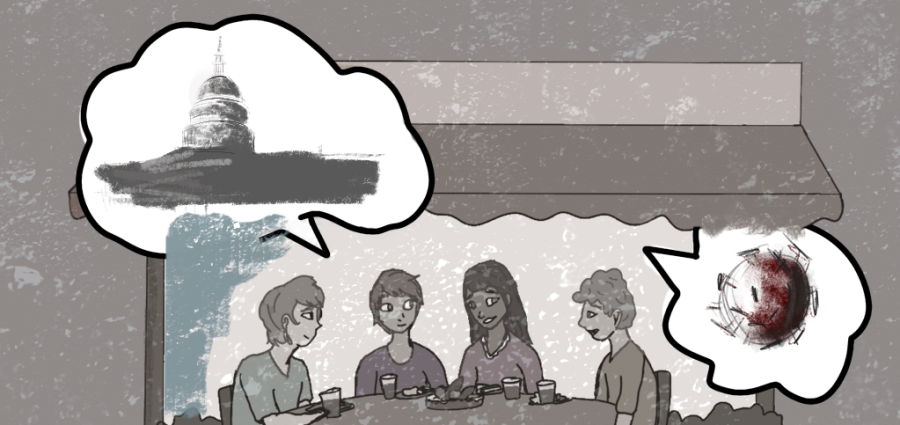How a new age of media-driven echo chambers has allowed a schism between enlightened consensus and public opinion.
Truth is based on facts. Facts are based on science. Science is based on data. Data is undeniable. It is time to make a distinction between fact and fiction. As many Americans disavow masks and vaccines, COVID-19 continues to wreak havoc and tragedy. We are seeing many abandon hard numbers to advocate instead for a person who lost the presidency.
There was once a time when the common man did not concern himself with science or math — that responsibility was left to the academics, the elite. But with the Enlightenment and eventually the rise of mass communication networks, every layperson was afforded access to sources of basic facts and science. Publicly-sponsored news networks streamlined objective reporting on politics, research, and many other intellectual fields. This access helped the common man draw conclusions based on facts rather than conspiracy. Though we have seen misuse of this access by authoritarian governments, general consensus backed by unbiased investigations and information allowed the people to disagree without abandoning reality.
But now, a schism between science education and public opinion is once again apparent. With monied extremists creating alt-right pipelines and fringe social-media-based echo chambers, the learnèd are being overshadowed by propagandists. It is time to return to formulating opinions based on reality, not fantasy. It is our responsibility as the public to bolster academics while disparaging conspiracy theorists.
A country led by its people and for its people relies on an educated populace. Without a direct flow of facts between scholars and citizens, information fed to the masses by powerful propagandists is accepted despite its general baselessness. Though general knowledge about scientific and political consensus is the expectation we now accept as the norm, this was not always the reality.
When Galileo Galilei first constructed the Theory of Heliocentrism, the belief that the earth revolves around the sun not vice versa, his findings were largely inaccessible to the public. Rather than preaching science to the masses, he went to the elite, the Pope. Without an informed public to opine based on the evidence Galileo presented, the Catholic church was quick to falsely reassert the “truth” of geocentrism, the belief that the entire solar system revolves around Earth: that the universe revolves around humans. The Pope was able to swiftly squelch any credibility Galileo previously had by imprisoning him during the Inquisition. “Scientific” consensus was based on manipulative opinion, not scientific fact. General consensus relied on illiterate citizens’ blind faith in the aristocracy.
But with the Age of Enlightenment, more members of the citizenry were allowed at least some access to academia. As we forayed from the Middle Ages to the Age of Discovery, more common men and women became literate and informed. Increased access allowed the public to decide on the plausibility of theories based on data, not based on what the political authority wanted them to believe. Slowly, this unity between education and common knowledge led to other advances, such as when an emphasis on sanitization with public action led to the creation of the Public Health Act for England and Wales. Publicly-funded media such as PBS allowed the public to interact and listen to experts from all fields. Upon receiving data and scientific evidence, we were able to formulate our own opinions without debating on widely-accepted facts. But today is different. Today, media has become a source of not only science and news, but also of entertainment, and many of us are starting to conflate the two.
Debate over the meanings of fact is acceptable. Debate over the facts themselves is not. The COVID-19 guidelines presented by the CDC are backed by research proven to be effective. The certification of the election results by the Electoral College is backed by countless verification processes. But millions have chosen fiction over fact. They have chosen to listen to Tucker Carlson over the National Institute of Allergy and Infectious Diseases director Dr. Anthony Fauci, with the former claiming that there is “no evidence they [masks] work.” It is important to note that Carlson has been involved in lawsuits where his legal defense has been that he, a reporter, a conveyor of news and data, is not “stating actual facts” when speaking to his audience. Then what is he stating? He is a story-teller. A propagandist. A reality TV star. Not a journalist. And yet, millions upon millions view his commentary as fact: as reality. Primetime propagandists like Carlson are profiteering off presenting false narratives as the truth. It is time for us, the people, to lift scientific sources and headlines over clickbait-y fantasy headlines. Running an effective democracy necessitates that its people unite behind facts. It necessitates that they debate based on a set of accepted statistics and theories. Without our active pushback, millions are suffering from the pandemic. And millions more are spiraling into a black hole of baseless beliefs that the election was “stolen.”
Just as the Age of Enlightenment forced the Catholic Church to accept the legitimacy of the Heliocentric Theory, we must usher in an Age of Deprogramming to force powerful and influential people like Donald Trump to lead his followers to the truth. The fact is that Trump never won the popular vote, neither in 2016 nor in 2020. This alone should be proof enough that Joe Biden’s electoral win was not an anomaly and was in fact backed by a true majority of Americans. Trump’s election fraud claims have been shot down by virtually every court and scholar, yet he and multiple Republican lawmakers refused to accept this science-backed fact. This misinformation resulted in an assault on Capitol Hill, propagated by his followers. On Jan. 6th, 2021 we saw an insurrection. We saw an act of domestic terrorism undermining the basic tenets of our democracy. We saw the dangers of conspiracy when such falsehoods are presented as unequivocal fact. While many were broken from Trump’s spell following the attacks on Congress, prevention is always better than cure.
Now is the time to draw a clear and undeniable distinction between reality and reality TV, news and entertainment, and, of course, science and conspiracy. It is time for us to decide whether we step forward into an enlightened future united by objective consensus, or step back into a dark past divided by subjective delusions.
Art by Kalo Grimsby and Sparky Mitra for the UC San Diego Guardian

















Alice • Jan 18, 2021 at 5:26 am
New technologies give project managers great tools to improve collaboration, optimize planning, and improve efficiency when working on projects, read more about it here https://www.bloomberg.com/press-releases/2020-08-27/maven-announces-management-transition-and-new-funding-ross-levinsohn-named-ceo